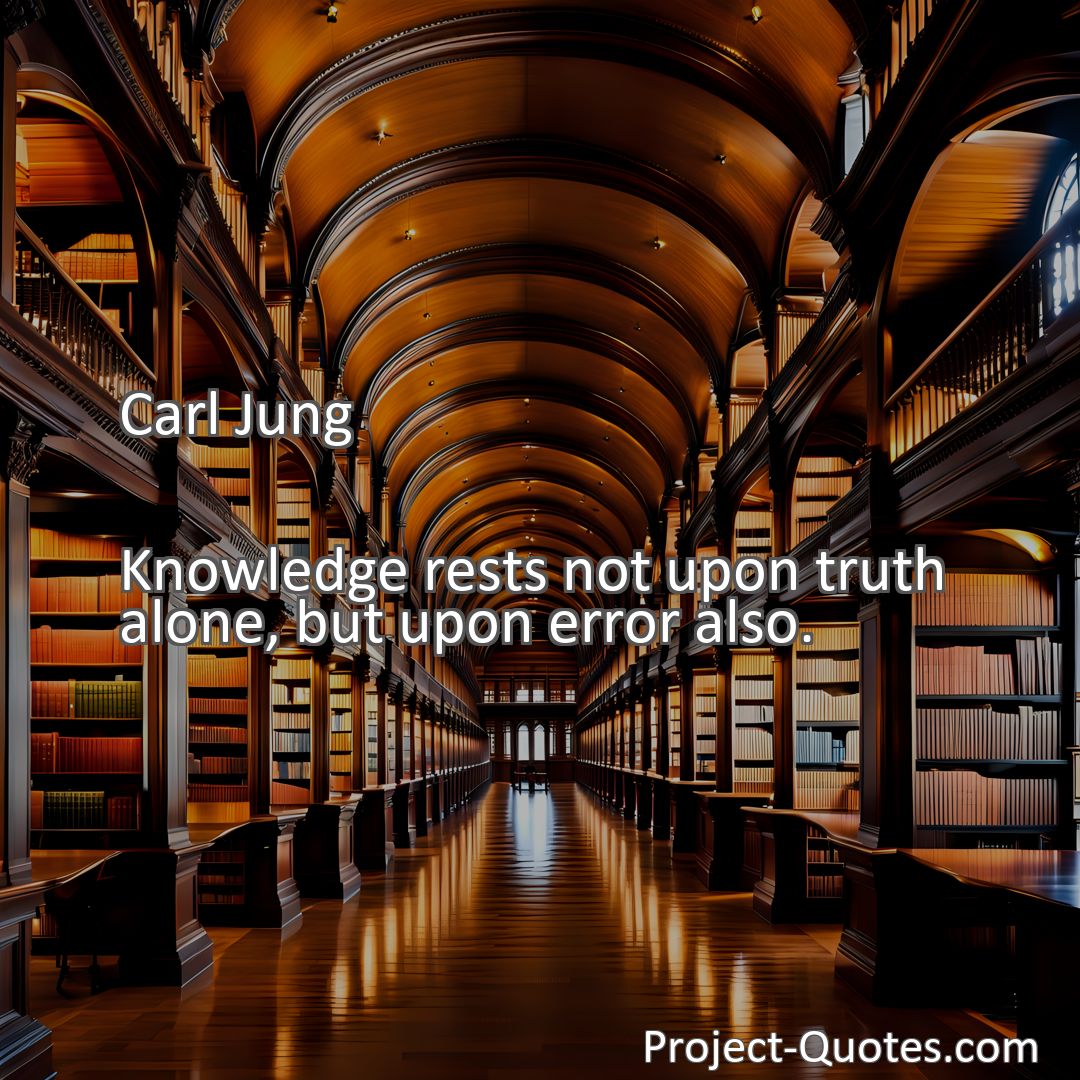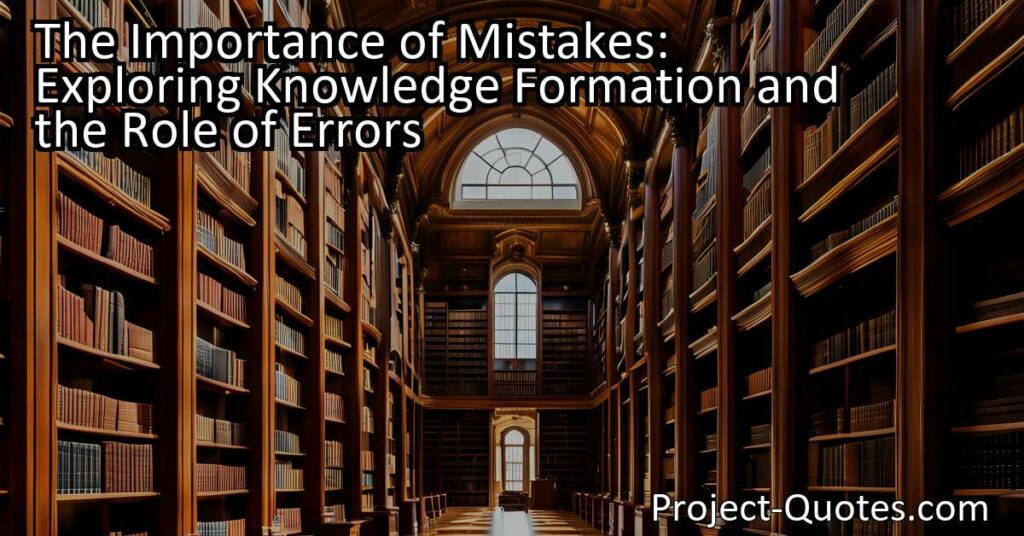Knowledge rests not upon truth alone, but upon error also.
Carl Jung
Embracing Mistakes: A Gateway to New Discoveries and Personal Growth. Mistakes are not just failures, but also opportunities for learning and growth. By embracing our mistakes, we can open ourselves up to new possibilities and expand our understanding of the world.
Table of Contents
Meaning of Quote – Knowledge rests not upon truth alone, but upon error also.
Have you ever thought about the intricate relationship between knowledge, truth, and error? It may sound paradoxical, but the quote “Knowledge rests not upon truth alone, but upon error also” by Carl Gustav Jung offers a thought-provoking perspective on this matter. While we tend to associate knowledge with truth, it is essential to acknowledge that errors and mistakes play a significant role in our intellectual growth and understanding of the world. In this article, we will delve deeper into the meaning behind this quote, exploring the importance of errors and their contribution to our overall knowledge. So, let’s embark on this enlightening journey!
To begin, we must understand what knowledge truly means. Knowledge encompasses the information, facts, skills, and understanding that we acquire through learning, experience, and reasoning. It is what enables us to make sense of the world and make informed decisions. Generally, we assume knowledge to be synonymous with truth the state or quality of being accurate, factual, and correct. However, Jung’s quote challenges this notion, suggesting that errors also contribute to knowledge formation.
The relationship between knowledge and truth can be likened to a puzzle. Truth serves as the correct piece that fits perfectly into the puzzle, completing the picture. We often strive to uncover the truth, seeking certainty in our understanding of the world. Yet, it is through errors and mistaken puzzle pieces that we come to recognize the truth. When a piece doesn’t fit, when we make mistakes or encounter errors, we are prompted to reevaluate our assumptions and perspectives. This, in turn, leads us closer to the truth, enhances our understanding, and enriches our pool of knowledge.
One example of this is in the realm of scientific discovery. Throughout history, scientists have made numerous errors and experienced failures in their pursuit of knowledge. These errors are not seen as setbacks but as opportunities for growth and progress. Each mistake and error leads to a better understanding of what works and what doesn’t. Thomas Edison, the inventor of the light bulb, famously said, “I have not failed. I’ve just found 10,000 ways that won’t work.” His relentless efforts and acceptance of errors ultimately led to the development of a practical and reliable light bulb.
Additionally, in the field of medicine, errors play a crucial role in advancing our understanding of the human body and improving patient care. Medical advancements and breakthroughs often arise from the analysis of errors made during surgeries, treatments, or diagnoses. Learning from these errors and understanding their causes allows physicians to refine their practices, leading to safer and more effective medical interventions.
Outside the realm of science and medicine, errors also contribute to knowledge formation in our everyday lives. Consider a student studying for a history exam. Initially, they might believe a certain historical event occurred in a specific year, only to find out later that they were mistaken. This recognition of error prompts the student to reevaluate their understanding, seek more accurate information, and expand their knowledge. Errors not only steer us away from misconceptions but also instigate critical thinking and the pursuit of truth.
Moreover, errors have the power to nurture important personal qualities, such as resilience, adaptability, and problem-solving skills. When we encounter setbacks or mistakes, we have the opportunity to learn from them, grow, and develop new strategies for success. As Albert Einstein once said, “A person who never made a mistake never tried anything new.” Our errors can serve as valuable lessons, guiding us towards a more profound understanding of ourselves and the world around us.
It is also worth acknowledging that errors are not always individual mistakes. They can also be collective, originating from societal misconceptions or biases. Throughout history, we have witnessed instances where societies held erroneous beliefs that were eventually overcome. For example, the prevailing belief that the Earth was flat was eventually debunked through scientific discoveries and exploration. The collective errors of society motivated scholars and explorers to seek the truth, leading to the development of accurate models of our planet.
While errors undoubtedly contribute to knowledge formation, it is important to distinguish between productive errors and detrimental misinformation. Productive errors are the ones that prompt critical thinking, curiosity, and growth. On the other hand, misinformation can lead to the perpetuation of falsehoods and hinder our understanding of the truth. Thus, it is essential to approach errors with a discerning and analytical mindset, enabling us to separate valuable lessons from misleading information.
In conclusion, while we often associate knowledge with truth, the quote by Carl Gustav Jung reminds us that knowledge is not solely built upon truth but also upon errors. Errors and mistakes serve as catalysts for growth, prompting us to reevaluate our assumptions, seek alternative paths, and ultimately discover the truth. From scientific breakthroughs to personal development, errors play a vital role in expanding our understanding of the world. So, let us embrace errors as stepping stones on our journey towards knowledge and truth.
I hope this quote inspired image brings you hope and peace. Share it with someone who needs it today!


